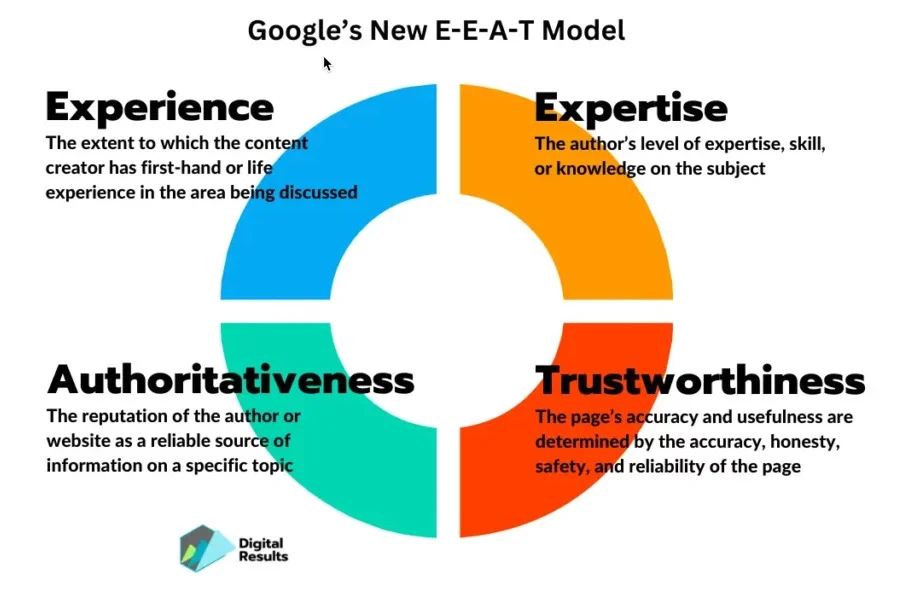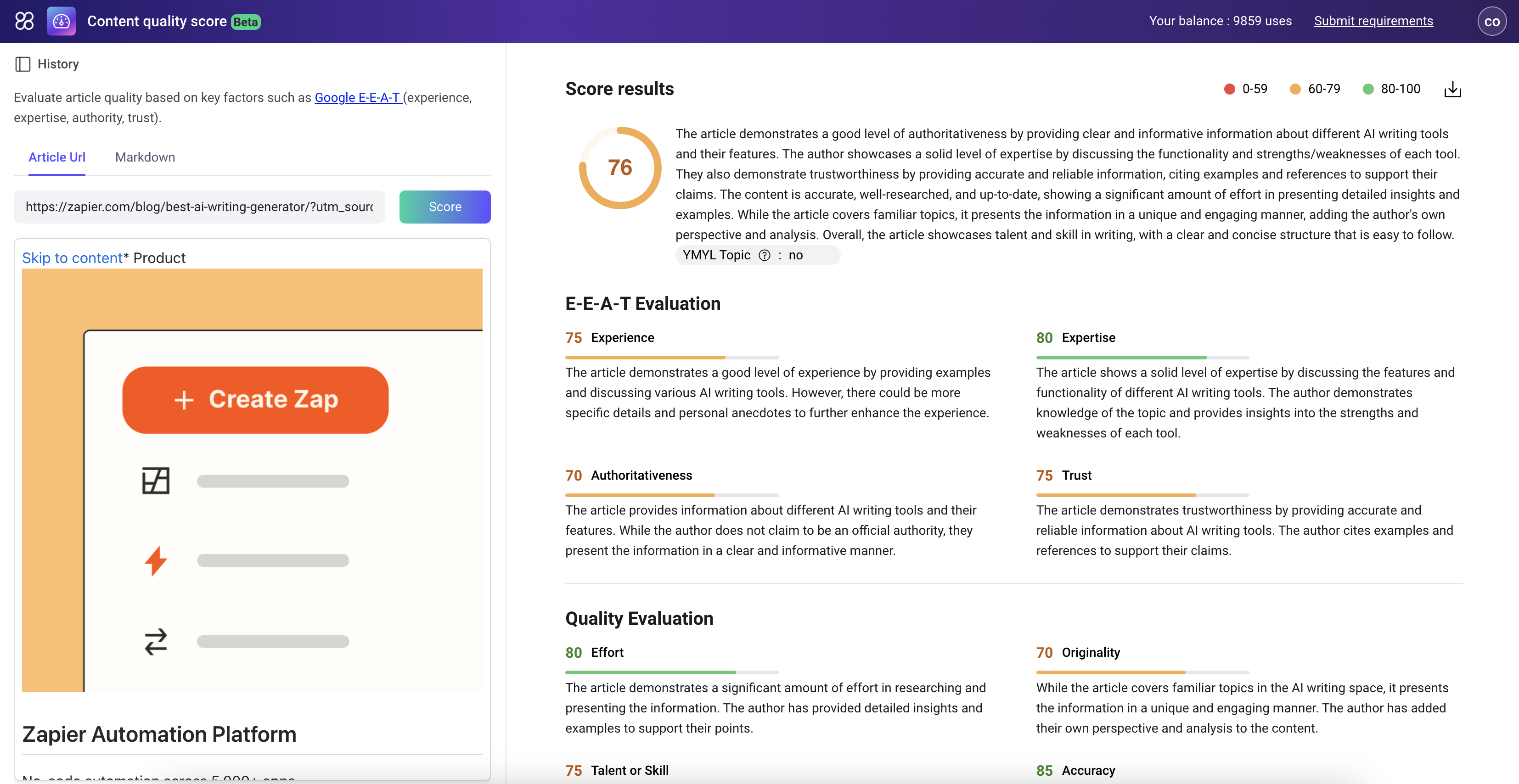Understanding the Difference Between EAT and EEAT

Introduction
In the world of SEO, understanding the concepts of EAT and EEAT is crucial for website owners, SEO professionals, and content creators. These acronyms stand for Expertise, Authoritativeness, and Trustworthiness (EAT) and Expertise, Authoritativeness, Trustworthiness, and Experience (EEAT). Both EAT and EEAT play a significant role in determining a website's credibility and ranking on search engine result pages.
EAT is a measure of a website's expertise, authoritativeness, and trustworthiness in a specific topic or industry. It serves as an indicator of the quality of content provided by a website. Google considers EAT as one of its ranking factors to ensure that users are presented with reliable information from credible sources.
On the other hand, EEAT encompasses all the elements of EAT but also includes experience. Experience refers to the practical knowledge and expertise gained through real-world application. By including experience in the evaluation process, EEAT adds an extra layer of credibility to websites.
Understanding the difference between EAT and EEAT is essential because it helps website owners focus on improving their overall online presence. By optimizing their websites for both EAT and EEAT factors, they can enhance their chances of ranking higher in search engine results pages (SERPs) while providing users with valuable information.
In the following sections, we will delve deeper into each concept individually to understand their importance for websites. We will explore how these factors can be improved upon to boost credibility and ultimately attract more organic traffic. So let's begin by exploring what exactly EAT entails.
Section 1: EAT
EAT, which stands for Expertise, Authoritativeness, and Trustworthiness, is a crucial concept in the world of SEO. It serves as a measure of a website's credibility and expertise in a specific topic or industry. Google utilizes EAT as one of its ranking factors to determine the quality and reliability of a website's content.
Definition of EAT
Expertise refers to the knowledge and skills possessed by the creators or authors behind the content on a website. It demonstrates that they have a deep understanding of their subject matter. Authoritativeness signifies that the website is considered an authoritative source within its niche or industry. This can be established through backlinks from reputable sources and endorsements from experts in the field. Trustworthiness indicates that users can rely on the information provided by the website without hesitation.
Importance of EAT for Websites
Websites with high EAT are more likely to rank higher in search engine results pages (SERPs). This is because Google values websites that demonstrate expertise, authoritativeness, and trustworthiness. While EAT is important for all websites, it holds particular significance for those that provide information on health, finance, legal matters, and other sensitive topics where accuracy and reliability are paramount.
Building EAT involves several key strategies. First and foremost, creating high-quality content is essential. This means producing well-researched articles, blog posts, videos, or any other form of content that provides value to users. The content should be accurate, up-to-date, and comprehensive.
Establishing authoritativeness requires gaining recognition from other reputable websites within your industry or niche. This can be achieved through guest blogging on influential platforms or earning backlinks from trusted sources. Collaborating with experts in your field can also enhance your website's authority.
Gaining trust from users is equally important. Transparency plays a significant role in building trust. Clearly stating the sources of information, providing references and citations, and ensuring that the website is secure and trustworthy are all ways to instill confidence in users.
By focusing on improving EAT, website owners can enhance their online presence, attract more organic traffic, and establish themselves as reliable sources of information within their respective industries. In the next section, we will explore EEAT and its significance in further detail.
Section 2: EEAT
EEAT, which stands for Expertise, Authoritativeness, Trustworthiness, and Experience, is an extension of the EAT concept. While EAT focuses on expertise, authoritativeness, and trustworthiness, EEAT adds the element of experience to the equation.

Definition of EEAT
EEAT encompasses all the elements of EAT but includes experience as an additional factor. Experience refers to the practical knowledge and expertise gained through real-world application. It signifies that the creators or authors behind a website have hands-on experience in their field and can provide insights based on their practical understanding.
The Role of Experience in EEAT
Experience plays a vital role in enhancing a website's credibility and reliability. Websites that demonstrate EEAT are seen as more trustworthy sources of information because they can draw upon real-life experiences to support their claims.
By incorporating experience into their content, websites can add an extra layer of credibility. This can be achieved through various means such as case studies, real-life examples, and testimonials from satisfied customers or clients. Sharing practical insights and lessons learned from personal experiences helps establish a deeper connection with users and reinforces the website's authority.
For example, a health-related website that provides advice on managing chronic conditions would benefit from including case studies showcasing successful treatment plans or testimonials from individuals who have improved their health using the provided strategies. These real-life examples demonstrate that the website's recommendations are not just theoretical but have been tested and proven effective in practice.
Websites with strong EEAT are more likely to attract organic traffic and retain users who value reliable information backed by practical experience. In the next section, we will explore the key differences between EAT and EEAT to better understand how these concepts impact website rankings and credibility.
Section 3: Differences Between EAT and EEAT
While EAT and EEAT share some similarities, there are key differences that set them apart. Understanding these differences is crucial for website owners, SEO professionals, and content creators to optimize their websites effectively.
Key Differences
The main difference between EAT and EEAT lies in the inclusion of experience. EAT focuses on expertise, authoritativeness, and trustworthiness as measures of a website's credibility. On the other hand, EEAT adds the element of experience to the equation. This means that websites with EEAT not only demonstrate expertise and authority but also showcase practical knowledge gained through real-world application.
EEAT can be considered a more comprehensive measure of a website's credibility because it takes into account both theoretical knowledge and practical experience. By incorporating experience, websites can provide users with valuable insights that have been tested in real-life scenarios.
Impact on Website Rankings
Websites with higher levels of EEAT are likely to have an advantage in search engine rankings. Google values websites that provide a well-rounded user experience, which includes both expertise and experience. By demonstrating expertise through high-quality content and showcasing practical knowledge gained through experience, websites can stand out from their competitors.
Having strong EEAT can help attract more organic traffic as users perceive websites with practical experience as more trustworthy and reliable sources of information. When users find value in the content provided by a website, they are more likely to engage with it, share it with others, and return for future visits.
By optimizing their websites for both EAT and EEAT factors, website owners can improve their chances of ranking higher in search engine results pages (SERPs) while building credibility among their target audience.
In the next section, we will explore strategies to improve both EAT and EEAT to enhance a website's overall credibility and user experience.
Section 4: Improving EAT and EEAT
Improving both EAT and EEAT is crucial for enhancing a website's credibility, authority, and user experience. Here are some tips and strategies to help you optimize your website for both factors.
How to score EEAT
Quickcreator provides novel ways to evaluate EEAT. You can access Quickcreator's online tools to review content and quickly get evaluation results and improvement suggestions.

Tips to Improve EAT
Create high-quality, well-researched content: Producing informative and valuable content is key to establishing expertise. Conduct thorough research, cite credible sources, and provide accurate information that users can rely on.
Establish authoritativeness through backlinks from reputable sources: Building a network of high-quality backlinks from authoritative websites in your industry helps establish your website's authority. Seek opportunities for guest blogging or collaborations with experts to earn these valuable backlinks.
Build trust with users through transparency and clear communication: Be transparent about the sources of information on your website. Clearly state any conflicts of interest or affiliations that may impact the objectivity of your content. Communicate openly with your audience, respond to their questions and concerns promptly, and provide clear contact information.
Strategies to Enhance EEAT
Include case studies and real-life examples in content: Incorporating real-life examples and case studies adds practical value to your content. It demonstrates that you have hands-on experience in applying the knowledge you share, making your website more trustworthy and reliable.
Collect and showcase testimonials from satisfied customers: Testimonials from happy customers or clients serve as social proof of your expertise and the positive experiences others have had with your products or services. Displaying these testimonials prominently on your website can boost confidence in potential users.
Highlight the practical experience and expertise of the website's authors: Introduce the authors or contributors behind the content on your website, emphasizing their qualifications, experience, certifications, or achievements in their respective fields. This helps build trust by showcasing the practical expertise they bring to the table.
By implementing these tips and strategies, you can improve both EAT and EEAT for your website. Remember that consistency is key – regularly update your content with fresh insights, continue building relationships with authoritative sources, engage with your audience genuinely, and adapt to changes in your industry to maintain a strong online presence.
Conclusion
In conclusion, EAT and EEAT are crucial factors that impact website rankings and credibility in the world of SEO. While EAT focuses on expertise, authoritativeness, and trustworthiness, EEAT takes it a step further by incorporating the element of experience. Both concepts play a significant role in determining a website's online presence and its ability to attract organic traffic.
Improving EAT involves creating high-quality content that is well-researched and informative. Establishing authoritativeness through backlinks from reputable sources and building trust with users through transparency and clear communication are also key strategies.
Enhancing EEAT requires including case studies and real-life examples in your content to showcase practical knowledge gained through experience. Collecting testimonials from satisfied customers or clients adds social proof to your expertise. Highlighting the practical experience and expertise of the authors behind the content helps build trust among users.
By focusing on improving both EAT and EEAT, website owners, SEO professionals, and content creators can enhance their website's credibility, authority, and user experience. This will ultimately lead to higher search engine rankings, increased organic traffic, and a stronger online presence within their respective industries.
Remember that optimizing for EAT and EEAT is an ongoing process. Continuously updating your content, building relationships with authoritative sources, engaging with your audience genuinely, and adapting to industry changes are essential for maintaining a strong online reputation.
So start implementing these strategies today to improve your website's EAT and EEAT factors for long-term success in the competitive digital landscape.
See Also
Maximizing Authoritative Influence in E-A-T: Enhance Your SEO Outcomes
The Significance of Proficiency in E-A-T: Showcase Your Expertise
Executing Performance Indicators for Content: A Tactical Method for SEO and Marketing Experts
Evaluating SEO Excellence: A Comprehensive Manual for Utilizing a Content Score Validator

